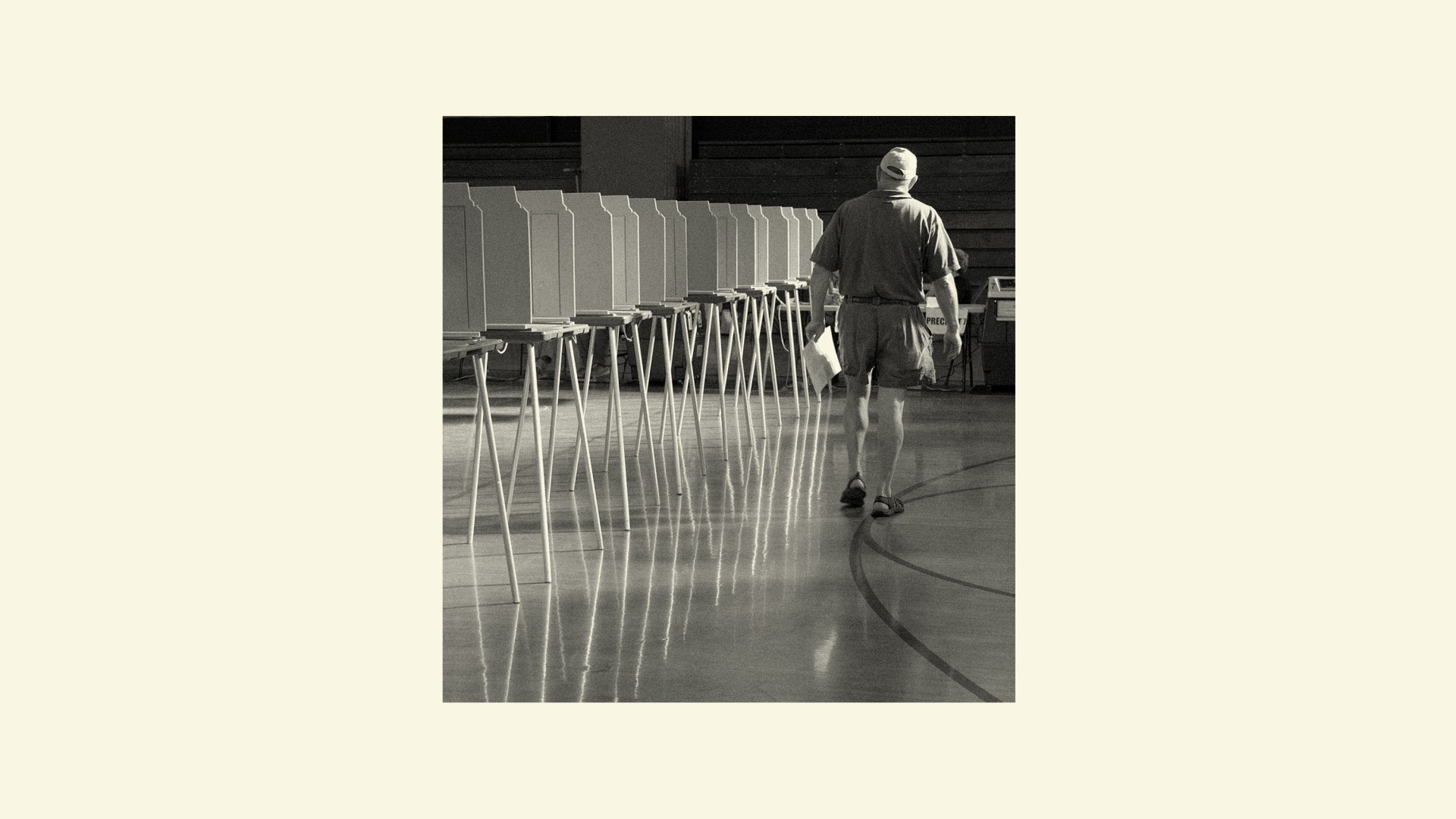Sophia Cappawana was elected to public office before ever casting a vote in a presidential election.
At 19, Cappawana serves on the local council in Duncannon, Pennsylvania; she conscientiously noted that she is “most likely” the youngest member in its history. The daughter of a former mayor and local tax collector, Cappawana had political ambitions since her student council days, but she knows she’s an outlier among Generation Z.
“I don’t feel like my peers pay attention as much,” said the young council member, a Presbyterian who attends Grove City College, a Christian liberal arts school in Pennsylvania.
Historically, young people have been among the least likely to show up at the polls. But that may be changing: Half of those under 30 voted in the 2020 general election, a new record, up from only 39 percent among that cohort in 2016.
And especially in a battleground state in a close presidential race, both parties are trying to nab younger voters. Cappawana sees political messaging when she’s scrolling Instagram or reading on Breitbart and Newsmax.
“I’ve made up my mind for Trump,” she said. She ticked off reasons, believing that the Republican candidate would be better for the economy and that global affairs would be less chaotic with him in charge.
Vice President Kamala Harris leads by 31 points over Donald Trump among likely voters ages 18 to 29 years old, according to last month’s Harvard Youth Poll. In 2020, exit polls found voters under 30 went for Joe Biden by around 60 percent compared with 36 percent for Trump.
Like the majority of evangelical voters overall, many politically active young evangelicals told CT they would also be casting their vote for Trump.
“You don’t see much of a generational divide when it comes to support for Trump: white evangelicals are pretty much all in, and they have been since 2016,” said Daniel Cox, director of the Survey Center on American Life at the American Enterprise Institute (AEI).
But he noted that the Harris campaign has been making a robust effort to reach out to young voters in general, including hosting events on college campuses. Some of that may break through to young evangelical voters as well, and CT interviewed several young Christian Harris supporters as well.
In a recent Lifeway Research survey, just under half of evangelicals under 35—48 percent—said they sided with Trump.
“Both parties are putting a priority on young voters in a way they maybe haven’t always in the past,” said Cedarville University political science professor Mark Caleb Smith.
“American politics is so polarized and opinions are so hard among most of the population, there just aren’t that many persuadable voters. And so the goal becomes to find new voters. … You look for young voters who are brand new to the system and try to pull them in, shape them from that point forward.”
Harris’s campaign has leaned into memes in it’s social media outreach to younger voters. The campaign also sought to court younger voters with policy announcements like a plan to provide payment assistance for first-time homebuyers and to provide a $6,000 tax credit for new parents.
Trump has courted young men by appearing on the social media platforms of men with huge followings, from YouTuber Logan Paul to video game streamer Adin Ross. Next week, Trump is sitting down for an interview with podcasting giant Joe Rogan.
Both campaigns have also had surrogates seeking to fire up younger voters: Pop megastar Taylor Swift endorsed Harris and Tim Walz on the day of the vice presidential debate and encouraged her fans to register to vote. On the conservative side, tech billionaire Elon Musk, as well as Charlie Kirk with the Republican youth organization Turning Point USA, have sought to mobilize young people.
Gloria Cope, a 23-year-old Virginia resident voting for the first time, has also noticed the political content on social media. On Instagram, she watches debate recaps and commentary from conservative influencers. “My algorithm has pretty much figured it out,” she said.
Cope plans to vote for Trump and said that as a Christian, the issues top of mind for her are abortion and religious freedom. Cope, who is Hispanic and grew up in a white foster family, said she also pays attention to border and immigration issues and foreign policy.
“A lot of the reasons I’m voting conservative, voting for Trump, are either religiously based or based on my circumstances,” she said.
On the other side of the aisle, Allie Cottom, a 19-year-old from Pittsburgh, is planning to vote for Harris.
Cottom was raised nondenominational and is in the process of converting to Eastern Orthodoxy. She’s also evolved politically, moving from the conservative politics of her parents to now a self-described moderate Democrat.
As a history and education major, she agrees with Democrats’ education policies, though she described some areas where she diverges to an extent, such as on abortion policy. She also believes the Democrats align more with her religious values than Republicans at the moment.
“Your Christian values should lead you to love others and not necessarily take it upon yourself to judge them and try to ‘fix them.’ That’s not our job,” Cotton said. “I think it’s important to recognize that Christians should help people and evangelize if that’s what your denomination is focused on. But it’s more about how you treat others and less about what you get out of it.”
She pushes back when fellow Christians insinuate you can’t be a Christian and a Democrat.
“Being a Democrat is not a monolith,” she said. “You can agree and disagree with different things in the party in the same way I’m sure a lot of Republicans don’t agree with everything their party is doing.”
Jacob Reese is one young Republican who doesn’t agree with everything his party is doing at the moment.
“I don’t think [Trump] represents the entire corpus of what the American conservative movement is,” he said.
He’s found some of Trump’s rhetoric “extremely irresponsible” and some of the former president’s stances on social issues—such as “his position on life” disappointing. He referenced the watering down of the Republican Party platform when it comes to abortion.
“We can be realistic about Donald Trump and JD Vance, where they’re at on life. You can be honest about that and recognize they’re not a Mike Pence on life,” Reese said. “But it doesn’t mean that we have to undermine what I believe is a core value of Republican platforms since Reagan—standing for life.”
Reese also disagrees with Trump’s protectionist trade policy, saying he prefers a free market model to one that relies on widespread tariffs, believing that will cause prices to rise.
But he still plans to vote for Trump, citing stronger disagreements with Democrats’ policy positions.
Reese said he and his friends discuss politics but have tried to keep it all in perspective: “Whenever I get annoyed at some stupid policy things that the Trump administration comes out with or another terrible idea from the Kamala Harris camp, ultimately, I have to remind myself, this is temporary. It’s very important we should be engaged, but it’s not the ultimate thing.”
At AEI, Cox has found in focus groups that there may be less enthusiasm in general for either party among young people, in contrast with previous generations.
“The millennial generation, when they were young, during the Obama years, were not just supportive of Obama—they were Democrats. They identified as Democrats. They generally believed in the Democratic Party.”
But the “same is simply not true for Generation Z,” who have told Cox they don’t believe Democrats are doing enough on issues that are important to them.
“The Democrats have squandered a huge advantage among young voters, who are seemingly much more divided than you feel like they should be, given how unpopular Trump has been among young people since he first arrived on the scene,” Cox said.
Adam Mikhail, a 19-year-old international relations major at Wheaton College, is one of those young voters. A dual citizen, Mikhail grew up in Cairo, the son of Coptic and evangelical parents, and said his stances shifted to the left due to the political instability he experienced in Egypt.
On issues like economics, criminal justice, and health care, Mikhail’s faith leads him to back policies that he believes support “human life and flourishing, justice, neighborly love, and good stewardship.” He said has been disappointed with several recent Democratic positions, including on the Israel-Gaza war.
“Frankly, I used to be a fan of Kamala Harris when she was running for president in 2020. She seemed to genuinely support a progressive platform,” Mikhail said. Now he believes she’s “pulled back to cater to conservatives and moderates.”
Mikhail voted early for Harris, more out of hopes it will help prevent a second Trump term than out of genuine enthusiasm for Harris herself. He listed concerns with Trump’s refusal to concede his election loss and the January 6 Capitol riot.
While young people are inundated with political information online, Mikhail said campaigns need to do more than show up in the places where young people are to truly earn their support. Many of his peers are politically apathetic and distrustful of politicians.
As many as half of young people will sit out this election, according to Cox, yet their voices, opinions, and approach to the public square will still shape American life around them, even if they’re not reflected in the exit polls.
“Young voters are essential to winning, but we also aren’t all easily convinced,” Mikhail said. “Targeting Gen Z through social media trends will not automatically earn a vote, as many of us want to be convinced that the vote will matter.”






























































